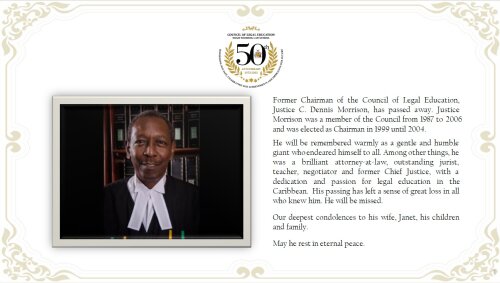Best Arrests & Searches Lawyers in Trinidad and Tobago
Share your needs with us, get contacted by law firms.
Free. Takes 2 min.
Or refine your search by selecting a city:
List of the best lawyers in Trinidad and Tobago
About Arrests & Searches Law in Trinidad and Tobago
Arrests and searches in Trinidad and Tobago are carried out according to the country's laws and regulations. These laws govern how law enforcement authorities can arrest individuals and conduct searches of premises and vehicles.
Why You May Need a Lawyer
You may need a lawyer in situations where you have been arrested or subjected to a search by law enforcement authorities. A lawyer can help protect your rights, provide legal advice, and represent you in court if necessary.
Local Laws Overview
In Trinidad and Tobago, arrests can be made with or without a warrant, depending on the circumstances. Searches of premises or vehicles may also be carried out with or without a warrant, again depending on the situation. It is important to be aware of your rights and the procedures that must be followed during an arrest or search.
Frequently Asked Questions
1. Can the police arrest me without a warrant?
Yes, the police can arrest you without a warrant if they have reasonable grounds to believe you have committed a crime.
2. Can the police search my home without a warrant?
In some circumstances, the police can search your home without a warrant if they have reasonable grounds to believe that evidence of a crime is present on the premises.
3. What should I do if I am arrested?
If you are arrested, you have the right to remain silent and the right to legal representation. It is important to exercise these rights and contact a lawyer as soon as possible.
4. Can I refuse to be searched by the police?
It is generally advisable to cooperate with the police during a search. Refusing to be searched may lead to further legal complications.
5. What are my rights during a search?
During a search, you have the right to observe the search, request a copy of the search warrant if one is being executed, and ask for the names and badge numbers of the officers conducting the search.
6. Can the police search my vehicle without a warrant?
The police can search your vehicle without a warrant if they have reasonable grounds to suspect that you are involved in criminal activity.
7. Can I be released on bail after being arrested?
Depending on the nature of the offense and other factors, you may be eligible for bail after being arrested. A lawyer can help with the bail application process.
8. What should I do if I believe my rights have been violated during an arrest or search?
If you believe your rights have been violated, you should document the incident as best as you can and contact a lawyer to discuss your options for legal recourse.
9. How long can I be held in custody after being arrested?
In Trinidad and Tobago, a person can be held in custody for a reasonable period of time before being formally charged or released. The exact duration may vary depending on the circumstances of the case.
10. Can I sue the police for wrongful arrest or search?
If you believe you have been wrongfully arrested or subjected to an unlawful search, you may have grounds to file a civil lawsuit against the police. A lawyer can advise you on the best course of action in such cases.
Additional Resources
For more information on arrests and searches in Trinidad and Tobago, you can contact the Law Association of Trinidad and Tobago or seek guidance from a local legal aid organization.
Next Steps
If you require legal assistance in matters related to arrests and searches in Trinidad and Tobago, it is advisable to consult with a qualified lawyer who specializes in criminal law. A lawyer can provide you with the necessary guidance and representation to protect your rights and interests.
Lawzana helps you find the best lawyers and law firms in Trinidad and Tobago through a curated and pre-screened list of qualified legal professionals. Our platform offers rankings and detailed profiles of attorneys and law firms, allowing you to compare based on practice areas, including Arrests & Searches, experience, and client feedback.
Each profile includes a description of the firm's areas of practice, client reviews, team members and partners, year of establishment, spoken languages, office locations, contact information, social media presence, and any published articles or resources. Most firms on our platform speak English and are experienced in both local and international legal matters.
Get a quote from top-rated law firms in Trinidad and Tobago — quickly, securely, and without unnecessary hassle.
Disclaimer:
The information provided on this page is for general informational purposes only and does not constitute legal advice. While we strive to ensure the accuracy and relevance of the content, legal information may change over time, and interpretations of the law can vary. You should always consult with a qualified legal professional for advice specific to your situation.
We disclaim all liability for actions taken or not taken based on the content of this page. If you believe any information is incorrect or outdated, please contact us, and we will review and update it where appropriate.
Browse arrests & searches law firms by city in Trinidad and Tobago
Refine your search by selecting a city.











